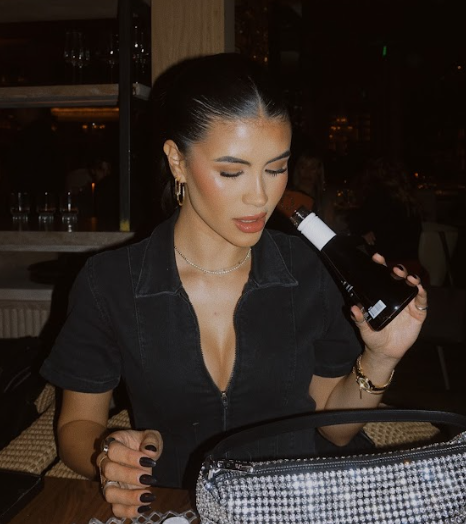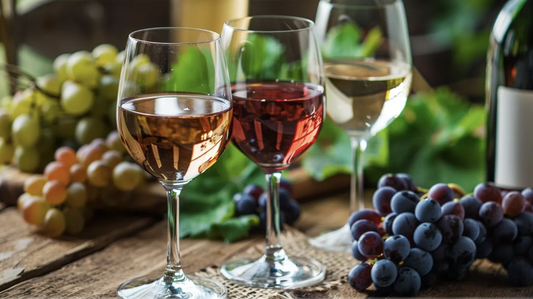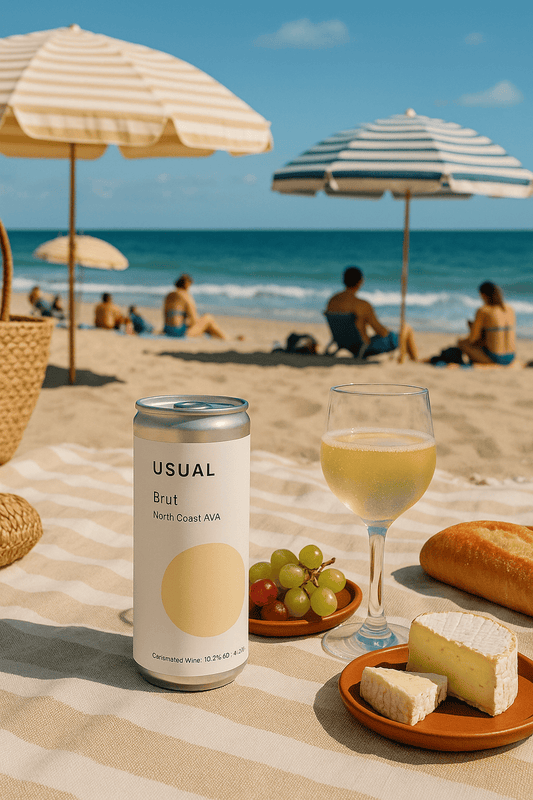
Sleepy After Wine? The Science Behind That Post-Glass Drowsiness
Matt CoenenYou’re halfway through a glass of red at dinner when it hits: the warm flush in your cheeks, your shoulders slacken, and — yawn — you’re suddenly ready for bed. Sound familiar? You’re not alone. While wine is often associated with unwinding, the drowsiness it brings can feel surprisingly abrupt.
The reasons behind this post-glass fatigue go far beyond just “drinking too much.” From the way alcohol interacts with your brain chemistry to the compounds naturally present in wine, there’s a lot happening behind the scenes, and understanding it can help you sip more mindfully, especially if you’re trying to stay alert during a social evening or night out.
Alcohol and Your Nervous System
Let’s start with the basics: alcohol is a depressant. That doesn’t mean it makes everyone sad, but it does slow down your central nervous system. When you drink wine, alcohol enhances the effects of GABA, a neurotransmitter that calms the brain, leading to slower reflexes, relaxed muscles, and often, a wave of sleepiness.
Wine can be particularly potent here. Despite its gentle reputation, many wines have alcohol levels between 12–15%, which is enough to have a sedative effect even after just one serving, especially if you’re drinking on an empty stomach or already feeling fatigued. Your body weight, alcohol tolerance, and metabolism all play a role, too. In short, it’s not your imagination: wine really can hit you faster and harder than you expect, even in small amounts.
Sugar and Blood Sugar Crashes
Not all wines are created equal in terms of sugar content. While many dry wines have little to no residual sugar, sweeter wines — like Riesling, Moscato, or certain rosés — can contain more. Even modest amounts of sugar can cause your blood sugar to spike, especially if you’re drinking on an empty stomach. And after the spike comes the crash.
That crash is what can leave you yawning, foggy-headed, or even lightheaded. Your body burns through the sugar quickly, which can cause a drop in energy levels and amplify the fatigue you were already starting to feel from the alcohol. This is particularly noticeable in social settings where you might be grazing instead of eating a full meal. It’s not just the wine making you sleepy — it’s your blood sugar rollercoastering behind the scenes.
Tannins, Histamines, and Other Compounds
Wine is a naturally complex beverage, and beyond alcohol and sugar, it contains several compounds that can affect how you feel, especially if you’re sensitive to them.
Tannins
Tannins, found in the skins, seeds, and stems of grapes (and especially concentrated in red wines), give wine structure and a dry, puckery mouthfeel. They also stimulate the release of serotonin in the brain. In small doses, serotonin helps regulate mood and sleep. But in sensitive individuals, this spike can lead to headaches or an overwhelming urge to snooze.
Histamines
Then there are histamines, naturally occurring in fermented foods like wine. For some people, histamines cause symptoms like flushing, sinus pressure, and — you guessed it — fatigue. If you’ve ever felt inexplicably worn out after just one glass of wine, histamines could be part of the reason.
Sulfites
Sulfites, often blamed for wine headaches and drowsiness, are more likely a scapegoat in this context. While they can cause reactions in people with true sulfite sensitivity, they’re more associated with respiratory symptoms than fatigue. The real sleepy culprits are more likely the histamines and tannins working in tandem with the alcohol itself.
Red vs. White vs. Rosé: Does the Type of Wine Matter?
The short answer is: yes. Different types of wine contain different compounds that can influence how you feel after a glass.
Red wines tend to pack the most punch when it comes to compounds like tannins and histamines. Because reds are fermented with grape skins, they contain more of these naturally occurring elements, which can contribute to fatigue, flushing, and that heavy-headed feeling some people get after just one pour. Reds also often have higher alcohol content than whites or rosés, which can intensify their sedative effects.
White wines are typically lower in tannins since the skins are removed before fermentation. That means they’re less likely to cause serotonin surges or tannin-related drowsiness. However, some white wines — especially sweeter ones like Moscato or off-dry Riesling — may have more residual sugar, which can lead to blood sugar crashes and sleepy crashes of their own.
Rosé wines fall somewhere in the middle. They’re made with limited skin contact (which gives them their pink hue), so they contain some tannins and histamines, but generally in smaller amounts than reds. They also tend to be light and refreshing, often with moderate alcohol and sugar content, making them a gentler choice for those who want to stay energized.
Takeaway: If you’re especially prone to wine-induced drowsiness, consider avoiding bold reds late in the evening and opting instead for a dry white or rosé with lower alcohol and sugar content.
When and How You Drink Matters
Even the cleanest wine can leave you drowsy if the context is right. Your environment and drinking habits have a big influence on how your body responds.
-
Timing matters. If you’re sipping wine late in the evening, especially in low lighting or after a big meal, your body’s natural circadian rhythm may already be nudging you toward rest. Add alcohol into the mix, and that nudge becomes a full-on push toward sleep.
-
Pacing is key, too. Drinking wine quickly can cause a rapid rise in blood alcohol concentration (BAC), making the sedative effects more intense. The same glass of wine will feel different if it’s savored slowly over a meal versus downed in 20 minutes at happy hour.
-
Don’t forget about meal composition. Rich, heavy foods slow down digestion, which can leave you feeling sluggish and bloated, especially when paired with a glass or two of red wine. Drinking wine without food, on the other hand, can intensify its effects since there’s nothing in your stomach to help slow alcohol absorption. Both scenarios can lead to sleepiness, but for different reasons.
Tips for Staying Alert While Drinking Wine
You don’t have to ditch wine to stay awake. But a few smart tweaks can go a long way in avoiding that post-glass slump:
-
Opt for lower-ABV wines. Look for bottles around 10–12% alcohol if you’re planning to be social or stay out late.
-
Sip slowly and mindfully. Stretch out a single glass over time to keep your BAC low and steady.
-
Eat while you drink. Pair your pour with protein, fiber, and healthy fats — foods that stabilize blood sugar and slow alcohol absorption.
-
Hydrate between sips. Alcohol is dehydrating, and dehydration can intensify feelings of fatigue. Alternate wine with water.
-
Skip the sugar bombs. If you’re sensitive to sugar crashes, opt for dry wines with little to no residual sugar instead of sweeter varieties.
These strategies won’t eliminate all of wine’s relaxing effects (and really, that’s part of the charm), but they can help you avoid falling asleep at the table.
Enjoy Usual Wines
At Usual Wines, we believe wine should feel as good as it tastes. That’s why we do things differently: no added sugars, no unnecessary sulfites, and nothing artificial — just clean, sustainably farmed grapes and minimal intervention winemaking. The result? A fresher, more natural wine that’s less likely to leave you feeling groggy after a single glass.
And speaking of glasses, ours come in perfectly portioned, single-serve bottles. That means no overpouring, no guesswork, and no commitment to opening an entire bottle on a weeknight. If wine usually makes you sleepy, try our Red (14.5% alcohol), Brut (14.5% alcohol), or Rosé (or our Mixed Pack for all three) and see how your body responds. You might just discover that when the wine is cleaner, the experience is more enjoyable, all without sacrificing the flavor or fun.
Frequently Asked Questions
1. Why does wine make me feel sleepy so quickly?
Wine is a depressant that affects your central nervous system, increasing relaxation and slowing brain activity, which can make you feel drowsy, especially if you’re already tired or drinking without food.
2. Do red wines make you sleepier than whites?
Red wines tend to have more tannins and histamines, both of which can contribute to drowsiness or fatigue in sensitive individuals.
3. Does Usual Wine contain sugar or sulfites?
Nope! Our wines are made without added sugars and contain only naturally occurring sulfites. That’s part of what makes them feel lighter and cleaner.
4. Can Usual Wines help reduce wine-induced drowsiness?
While everyone’s body reacts differently, many of our customers say they feel better after drinking Usual Wines — thanks to our minimal, clean ingredient list and easy-to-manage single-serve bottles.








